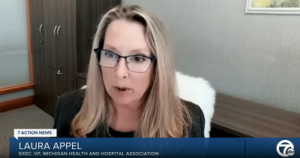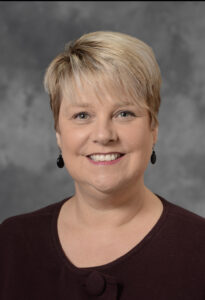
“Do the right thing. It will gratify some people and astonish the rest.” – Mark Twain
Last month’s CEO Report focused on our grave concerns with legislative proposals to mandate nurse staffing ratios, and the negative impact they would have on patient access to care. And we spent the entire month of September laser-focused on telling our story to elected officials, the media, business and healthcare trade groups and many others who care about the Michigan healthcare ecosystem. This advocacy work will continue, without question.
focused on our grave concerns with legislative proposals to mandate nurse staffing ratios, and the negative impact they would have on patient access to care. And we spent the entire month of September laser-focused on telling our story to elected officials, the media, business and healthcare trade groups and many others who care about the Michigan healthcare ecosystem. This advocacy work will continue, without question.
But the hallmark of the MHA and our members is to not simply advocate against bad public policy, but rather, to voluntarily do the right thing when it comes to the best interests of the patients and communities we serve. And when it comes to the safety and quality of the care we provide in Michigan hospitals, we indeed have a very special story to tell.
This year marks the 20th anniversary of the inception of the MHA Keystone Center, which was originally created in 2003 as a first-of-its-kind collaboration among hospitals to identify and implement practices that improve healthcare safety and quality and reduce cost. Acting as our safety and quality organization today, the MHA Keystone Center voluntarily identifies safety and quality improvement opportunities and develops solutions among Michigan hospitals to improve experiences for both patients and healthcare workers alike. The extraordinary partnerships among MHA Keystone Center hospitals have saved many lives as well as healthcare dollars.
It needs to be stressed that there is no mandate requiring participation; all Michigan hospitals and thousands of their team members voluntarily participate in MHA programs to improve the safety and quality of healthcare because of their missions to care for the sick and vulnerable. Because of our long history of success, a growing number of hospitals in other states are now part of MHA-led safety and quality initiatives. In addition, the hospital-based collaborative efforts first pioneered by the MHA Keystone Center have now been replicated in 48 of the 50 U.S. states and various other countries.
These initiatives are driven by evidence-based best practices and strongly supported by data. One great example of how engaged hospitals have seen great improvements on safety and quality outcomes is through the MHA Keystone Center’s leadership of the Great Lakes Partners for Patients (GLPP) Hospital Improvement Innovation Network (HIIN). Michigan hospitals saved 3,350 lives and avoided 25,304 harm events within hospitalized patients over a three-and-a-half-year period from Sept. 2016 to March 2020. In addition, our track record of outcome improvements includes the following:
- Reduced the rate of CAUTI (catheter-associated urinary tract infection) events by 49% between 2012 – 2018.
- Decreased CLABSI (central line associated blood stream infection) rates within ICUs by 35% between 2015 – 2018.
- Reduced early elective deliveries by 68% between 2010 – 2018.
- Reduced C. Diff rates by 15% from 2014 to 2017.
- Reduced postoperative pulmonary embolisms and/or deep vein thrombosis by 22% from 2014 to 2016.
- Reduced colorectal surgical site infections by 27% from 2014 to 2016.
This successful work led to the subsequent creation of the Superior Health Quality Alliance (Superior Health), which includes the MHA Keystone Center, along with our counterparts at the Illinois, Wisconsin and Minnesota hospital associations, and several other related organizations in the Midwest. Superior Health is funded by the federal government, which has clearly valued the ROI that is created by this work, both for Medicare and Medicaid patients for which they have a direct responsibility, as well as all patients.
On top of this work, the MHA Keystone Center has led hospitals on a high reliability journey for almost ten years now. Striving towards implementing and maintaining a high reliability culture means hospitals are focused on attaining zero preventable harm to patients, families and caregivers, making Michigan a safe place to receive care. Factors such as the pandemic, workforce shortages and increased rates of violence against healthcare workers all have emerged as challenges to this work. However, MHA Keystone Center member hospitals remain steadfast in their quest to reduce unintended harm in their facilities. One great example of how hospitals implement a high reliability culture is by stressing the importance of speaking up to prevent potential harm to patients or other staff members. Dozens of healthcare workers from hospitals throughout Michigan have been recognized by the MHA Keystone Center Speak-up! Award since it was launched in 2016. It is heartening that hospitals across the state, both large and small, urban and rural, have embraced an organizational culture that promotes and even celebrates anyone within the organization who speaks up to prevent harm.
Our to-do list in this realm is long and is constantly evolving. Based on the current needs of our membership, we are now focusing on reducing health disparities as our state strives to achieve health equity; improving maternal health outcomes; establishing age-friendly health systems; implementing solutions to address the opioid epidemic; facilitating person- and family-centered care; improving workplace safety; and providing emotional well-being support to healthcare workers through a partnership with the Duke Center for Healthcare Safety and Quality that has so far assisted 5,000 healthcare workers from 144 organizations throughout Michigan.
We know each of these efforts impact the health and well-being of countless Michiganders today. Thankfully, we have diverse funding support for our work; in addition to the federal government’s role noted above, the MHA Keystone Center has been funded by the Michigan Health Endowment Fund, and from our own hospitals who pay an annual fee for the services provided by our MHA Keystone Center PSO, a federally-certified Patient Safety Organization which collects adverse event data. But special recognition needs to be given to Blue Cross Blue Shield of Michigan (BCBSM), and their CEO Dan Loepp. Their initial support was instrumental in getting the MHA Keystone Center off the ground all those years ago, and we are now operating under a third round of very significant financial support from BCBSM that has been critical to our success.
Finally, I would like to acknowledge the great leadership of Sam Watson, our senior vice president of field engagement, and Sarah Scranton, our vice president of safety & quality, as well as the entire MHA Keystone Center Board of Directors, and of course the incredibly talented and dedicated MHA Keystone Center staff. We are proud to work every day with so many hospital leaders and clinicians who are dedicated to doing the right thing for patients and healthcare workers. At the end of the day, this is mission-driven work that all Michiganders can be proud of.
As always, I welcome your thoughts.





